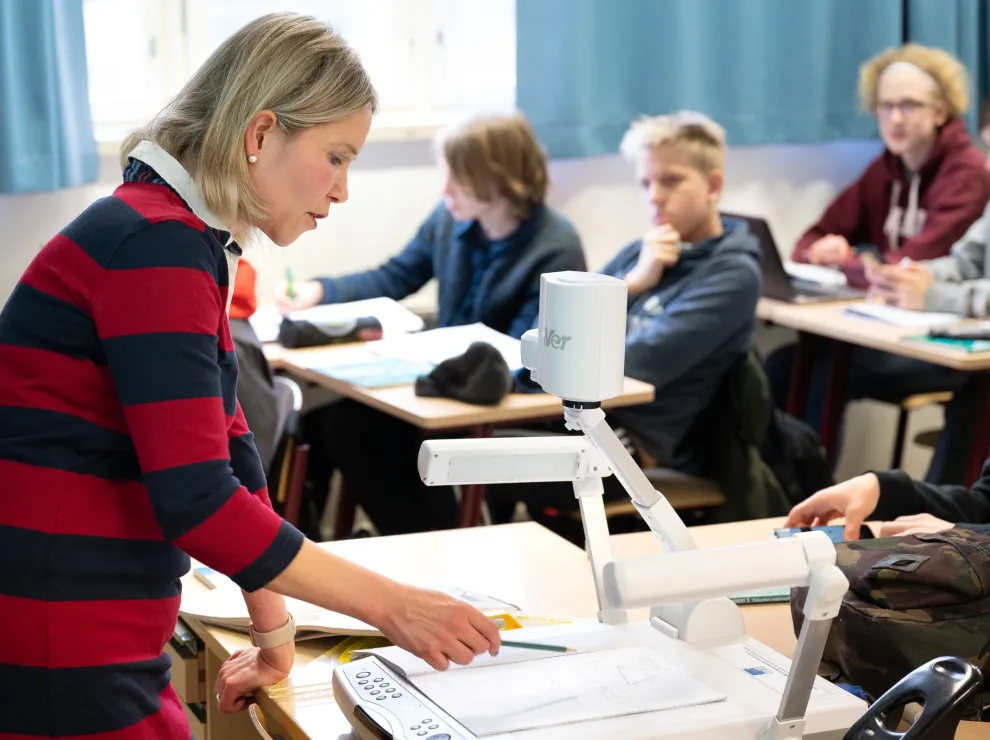
Municipal and county elections 2025
We at TEK want to do our part to ensure that technology and those who make it are visible during the elections. TEK member, are you a candidate in the municipal or county elections? Make a candidate page for yourself!
TEK exerts extensive influence on the work life of our members and the future of the tech industry. In addition to labour market questions, our lobbying efforts focus on sustainable development, expertise, equality in work life and industrial policy. We strive to promote the internationalisation of work life and to ensure the continuity of top tier expertise in the tech sector. We are also advocating for ethical development of technologies.
Here you will find more information on TEK’s nine most crucial impact targets.
1. Research and product development’s share of the gross domestic product must be raised to four percent
If we wish to succeed as a nation, the GDP share of research and product development must be raised to four percent. Public research, development and innovation investments must be directed so that they attract plenty of private investments as well.
2. Incorporating continuous learning into all training and education
In order to succeed professionally, we must all constantly develop our expertise. For the society at large, this means raising the overall level of expertise. The continuous learning of those with less formal education is especially important, as is bridging the expertise gap. Developing one’s expertise is not a luxury but a necessity, even to tech experts.
3. Funding of university education and basic research must be returned to a sustainable level
The goal of increasing the number of study places at universities found in prime minister Marin’s government platform is a justified step in the right direction. The number of study places is to be especially raised in technology education. However, increasing the number of study places must not be allowed to decrease the quality of the education. If the number of study places is increased, the amount of resources allocated for education must be raised in equal measure. This ensures the high quality of the education and adequate expertise in the tech sector in the future.
High-quality basic research is one of the basic tasks of universities and the basis of innovation. Universities must have the resources to conduct an adequate amount of basic research according their strategies.
4. Pay transparency must be brought within legislation in finland as well
In the private sector, including in the tech industry, salaries are a matter that is not talked about. This means that knowledge of salaries does not increase and the salaries are not seen as encouraging or fair. Studies have demonstrated that pay secrecy reduces the productivity of employees and increases dissatisfaction and employee turnover. Finnish and EU legislation already demand that the salary for the same work or work of equal value must be the same. However, this does not yet occur in practice. In Europe, pay transparency is taking steps forward as the European Commission will introduce a binding bill on the matter in the autumn. We can reduce the problems related to pay secrecy by including pay transparency in Finnish legislation as well. This would also give us an effective tool to promote equal pay.
5. Genuine and equal negotiations at workplaces
Labour market organisations play a crucial role in the preparation of legislative reforms that concern working life. As part of these reforms, we are reinforcing staff representation and resources on the local level to ensure more effective local negotiations. The Co-Operation Act will be reformed to support genuine and equal negotiations and agreements. Local negotiating will be expanded in collective agreements. The rights of employee representatives are strengthened in non-union companies with legislation. The conciliation system will be renewed to match the modern labour market.
6. Equitable transition must be made the highest priority of climate policy
Technology is key in solving the climate crisis. Climate policy must be advanced according to the principles of equitable transition. This means that people’s opportunities for employment and entrepreneurship are also ensured. Preparation of climate policies must involve everyone – including the third sector.
7. The growth and internationalisation of companies must be made a primary goal of industrial policy
In order to succeed, Finland needs companies that aim for growth. The growth and internationalisation of Finnish companies should be made one of the primary goals of industrial policy. Internationalisation requires a high level of expertise, well targeted support and the ability to expand.
8. Immigrants as a genuine part of the finnish labour market
Finland needs experts from abroad. In order to promote immigration, we must make Finland into an enticing place to work and live for international experts.
Currently Finland is losing a great deal of talent because of stiff immigration practices. The processes around work and residence permits must be made smoother and the deadlines must be shortened. Master’s students with immigrant backgrounds must be automatically granted a three-year work permit after graduation.
Sectors suffering from labour shortages must be the focal points of work-related immigration together with specialists, students and researchers who are crucial for research, development and innovation efforts.
9. As the number of study places is increased, resources must be increased in kind
The need for technology experts is constantly growing in Finland. The number of study places in the tech sector must be increased in a controlled fashion. The educational responsibilities of Finnish universities must remain clear and the high quality of the education must be ensured with adequate resources.
The most crucial basic competency for studies in tech fields is advanced studies in high-school mathematics or equivalent level of proficiency. The number of students taking advanced mathematics may be increased by allocating more resources to individual learning at the comprehensive school level.
High-quality student counselling that begins at the primary education level is also important in directing students from different backgrounds into the tech sector.
TEK's goals for the European elections 2024